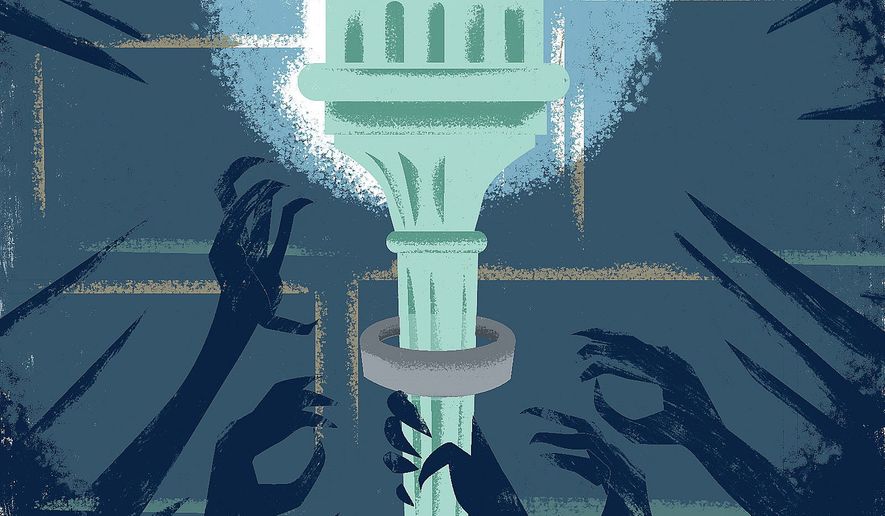OPINION:
Earlier this year, the Department of Justice, on behalf of the federal agencies it represents, began a campaign to stop Freedom of Information Act releases before the November election. In so doing, the Biden-Harris administration deprives the public of important documents that belong to them at the time that information is most useful and risks adding to the appearance of a politicized DOJ.
The Supreme Court has embraced the idea, first in EPA v. Mink (1973) and often thereafter, that FOIA is a means for Americans “to know what their Government is up to.” There are no provisions exempting politically embarrassing information or avoiding inconvenient timing. One would not know this from the current administration’s behavior.
For example, when the State Department resisted for nearly two years providing Congress or the media details about its newly created special climate envoy office, first run by former Secretary of State John Kerry and now by former White House aide John Podesta, the nonprofit group Power the Future used FOIA to request this information.
The State Department stonewalled the group over basic and generally nonprivileged facts such as the identities of climate office officials and whether any were among the activists financed and placed in government by activist charitable foundations. This secrecy prompted the group to make further requests about what the climate operation “is up to,” seeking key officials’ text messages, calendars, Teams, Zoom, chat logs and emails with the White House.
In response, beginning in mid-2024, the administration’s lawyers, led by the U.S. Attorney’s Office for the District of Columbia, which is tasked with defending most FOIA cases, went into total and unprecedented obstruct-and-delay mode.
In brief, Congress prioritized public records cases for prompt adjudication, requiring that the government answer FOIA complaints in 30 days rather than the typical 60 days in civil litigation. Answers in FOIA cases are no more than bland admissions or denials of the complaint’s assertions and a boilerplate list of defenses.
The answer, however, triggers a court order instructing the agency to inform the requester how many responsive records it has and its expected release schedule, with a clear implication that this should begin promptly.
This is what the government committed to avoid with ham-fisted determination. For example, almost without fail and right before the agency’s deadline to file, the attorney assigned to each case said that he or she had just been assigned the matter and needed another 30 days. Since June 1, and just in response to Power the Future and another group, Government Accountability & Oversight, this happened in 33 separate lawsuits — nearly every one we filed.
Were this true, the U.S. attorney’s office would be scandalously incompetent. Subsequent actions suggest that may not be the case.
In Power the Future’s State Department and Environmental Protection Agency cases, the U.S. attorney followed the court’s indulgence of more time to answer by filing motions seeking to stay, meaning further delay, when its new deadlines arrived.
These motions expressly acknowledged the government’s purpose was to allow more delays via demands to consolidate numerous intentionally drafted, discrete requests for particular records into large and complex requests that would surely languish inefficiently on the court’s docket for years.
Despite losing these motions, the State Department continues to refuse to process Power the Future’s requests unless the group agrees to pretend the State Department won. This defiance is astonishing and reflects either a confidence that consequences will never come or, if they do, are worth avoiding releasing the information sought.
Regardless of whether the government succeeds, its tactics have ensured no problematic documents will emerge in 2024.
Fortunately, Congress also provided a remedy in the event of such abuse. In response to DOJ replicating this clumsy, wasteful obstruction on behalf of the State Department, the EPA and other agencies, Power the Future has filed suit against both the State Department and the EPA and, for their role in facilitating the obstruction, DOJ and the U.S. Attorney’s Office for the District of Columbia.
The group is asking the court for injunctions to end this “pattern and practice” of engineering delay and therefore denying the release of public information and ordering the government to begin letting the public see the documents it owns.
The only transparency to be found through our nation’s sunshine laws these days is the exposure of a crystalline desire to delay any revelations about the Biden-Harris administration from emerging before voters pass judgment on its performance. For now, the public can read into that what it will.
• Chris Horner is an attorney in Washington who represents policy groups on open records requests and other matters. Daniel Turner is the founder and executive director of Power the Future, a national nonprofit organization that supports American energy jobs. Contact him at daniel@powerthefuture.com and follow him on X @DanielTurnerPTF.




Please read our comment policy before commenting.